Thailand is now stuck in a political stalemate. The democratic camp can win the House, but cannot choose the Prime Minister, while the pro-junta camp can choose the Prime Minister but cannot pass legislation through the House. Just one false step for the democratic camp, and Thailand will be under a disguised military dictatorship for the next four years.
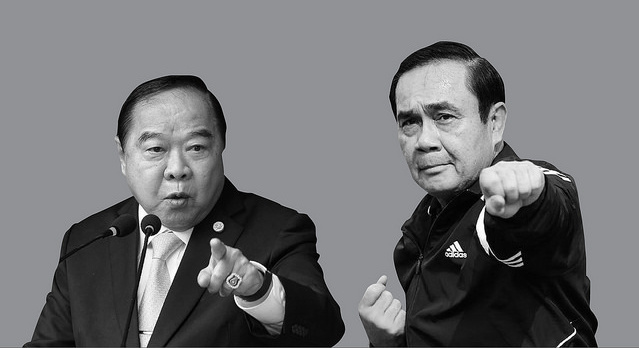
Prawit Wongsuwan (left) and Prayut Chan-o-cha (right)
The complete but unofficial election results have been released. Pheu Thai has the most MPs, followed by Palang Pracharat, Future Forward, Democrat, Bhumjaithai, Thai Liberal Party, Chartthaipattana Party, Chart Pattana Party, New Economics Party, Prachachart Party, Pheu Chart Party, Phalang Puangchon Thai Party, and others. Even though the official results will not be released until 9 May, we can see where this is going.
Palang Pracharat claims that it should get the first chance to form the government because it has the most popular votes. This argument has since been debunked by scholars. Pornson Liengboonlertchai from the Faculty of Political Science, Chulalongkorn University, argued that, according to the Constitution, Thailand is a representative democracy, not a direct democracy. It also has a political convention that the party which has the most MPs should get to form the government.
Thanathorn Juangroongruangkit, the leader of the Future Forward Party (FFP), said that he was ready to become the Prime Minister, but the FFP will not nominate him, because the Party did not get the most MPs. So the FFP announced that Pheu Thai should be the first party to form a government. The FFP also supported Pheu Thai’s candidate Sudarat Keyurapan to be the Prime Minister, although she may not be elected as MP, due to the extremely unusual election system designed by the junta, in which Pheu Thai may get no party-list MPs.
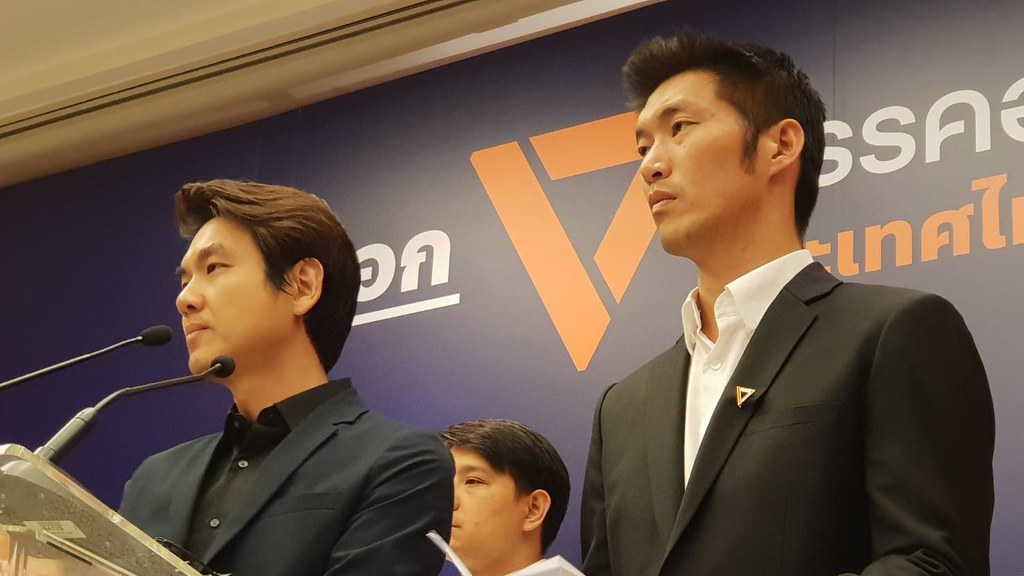
Piyabutr Saengkanokkul (left)
Thanathorn Juangroongruangkit (right)
The ball now goes to Pheu Thai. Sudarat has said the party is ready to form a government regardless of whether she becomes the Prime Minister. Yesterday (27 March), 7 parties formed a democratic bloc, with 255 out of 500 MPs, including Pheu Thai, Pheu Chart, Future Forward, Thai Liberal Party, Prachachart Party, Phalang Puangchon Thai Party, and New Economics Party. All of them signed an anti-NCPO MOU, except the New Economics Party whose leader, Mingkwan Sangsuwan, said he had a meeting with the Election Commission (ECT) during the press conference. However, he confirmed that he is joining the democratic camp in an interview with The Standard.
So the democratic camp has apparently won the House. However, the 2017 Constitution says that during the first 5 years after the first government is formed, the 250 senators, who are to be appointed by the junta, can join the House in voting for the Prime Minister. These circumstances may lead to a political stalemate and a very unstable government, where the pro-military bloc wins the Prime Ministerial seat but cannot pass legislation, and the democratic bloc wins the House but does not get to choose the Prime Minister.
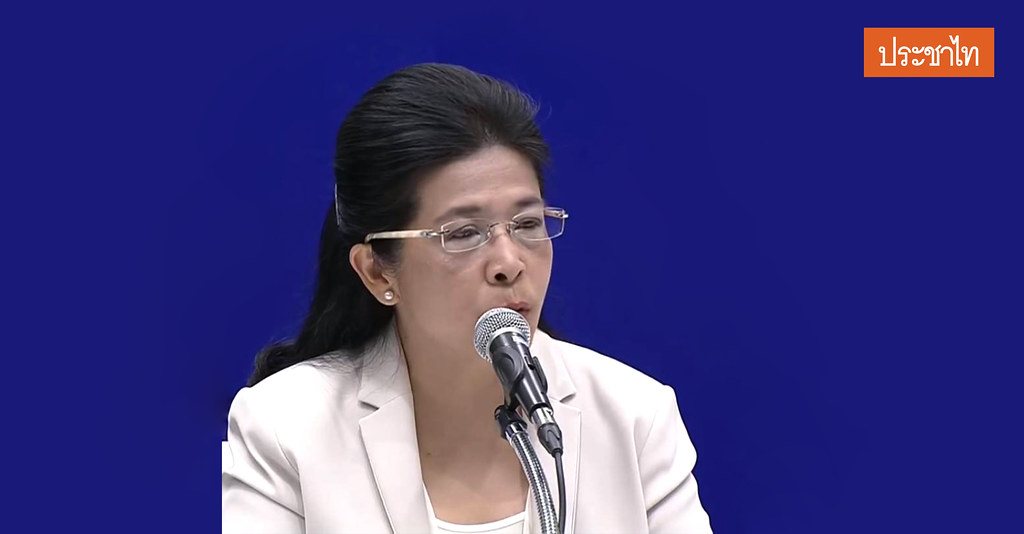
Sudarat Keyurapan
This political stalemate may continue until the next parliament is dissolved, which may not take all that long. For now, the only way out could be defection. If the democratic camp is able to pressure the 250 appointed senators into voting for their Prime Minister candidate, the government will be more stable and the House can pass legislation. The democratic bloc will also need other undecided MPs to join them in order to secure 376 out of 750 votes in parliament.
But this is not an easy task, as the Democrat Party, which now has 54 seats in parliament, will most likely join Palang Pracharat in forming a government. At the end of the election day on 24 March, then party leader Abhisit Vejjajiva resigned from his position, his reason being that the party won less than 100 seats. Abhisit said earlier that he would not support Gen Prayut Chan-o-cha to become the Prime Minister, but may let Palang Pracharat join his government if the party accepted his conditions. His resignation therefore opens up the opportunity for the Democrat Party to join a Prayut-led government. Korn Chatikavanij, the deputy leader of the Democrat Party, said that it is “impossible” for the Democrat Party to join a Pheu Thai government. Assawin Wipoosiri, the interim deputy leader of the Democrat Party, also said that Prayut would be the legitimate Prime Minister, and it depends on whether Palang Pracharat will invite the Democrats to join its coalition.

Abhisit Vejajiva's resignation
But the Democrat Party is facing an identity crisis. In this election, new parties emerged and forced it to re-position itself: it can no longer be as right wing as Palang Pracharat nor can it be as left wing as Pheu Thai or Future Forward. In Thailand, the Democrat Party is nicknamed the ‘cockroach party’ for its lack of consistency and its support of military coups. However, if it stays that way, it can no longer survive, but it cannot be pro-liberal democracy as its New Dem faction wishes to be because of its bad record. In face of this identity crisis, Parit Wacharasindhu, the leader of the New Dems, said that he will reconsider himself if the Democrats really join a Palang Pracharat government, since he does not support Prayut’s staying in power. Bhichai Rattakul, a former leader of the Democrat Party, also told Matichon that he supports the Democrat Party joining a Pheu Thai government because, according to the principles of representative democracy, the party with the most MPs should get to form the government first. It will take a while before its position is settled.
But since the democratic camp openly announced their coalition, they have placed themselves at an even greater risk of attacks from both Palang Pracharat and the ECT. Before the election, Palang Pracharat was able to convince 112 members of other parties to join them, and there is no guarantee that it won’t happen again. Also, the New Economics Party, which has said that it will join the democratic camp, has not signed the MOU and may opt out at any time. The democratic bloc has 253 seats in parliament, and if six MPs defect, the democratic bloc will have only 247 MPs and will no longer hold the majority in the House.
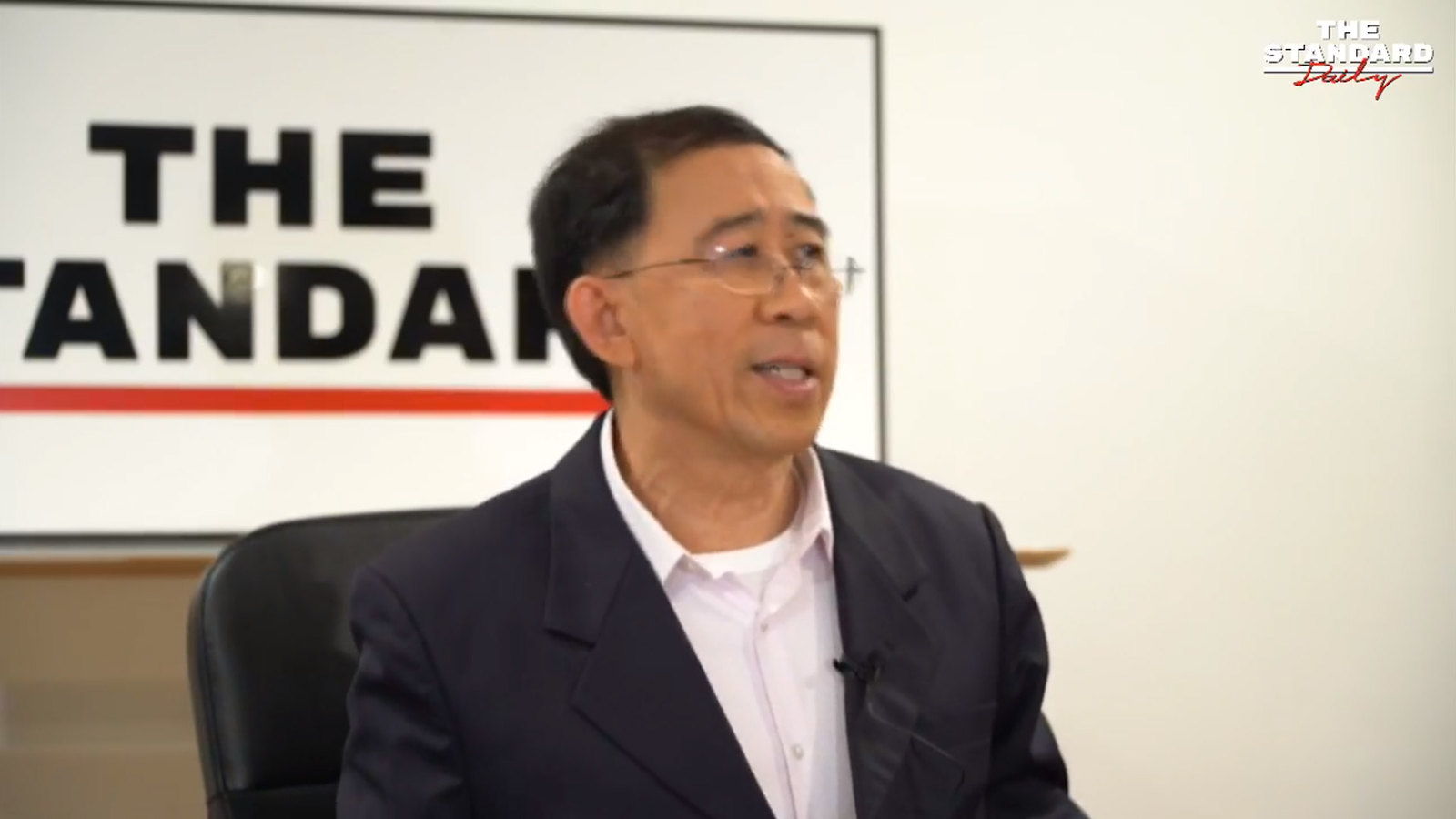
The New Economics party led by Mingkwan Sangsuwan may defect.
The democratic camp also has to worry about the ECT’s power to issue penalties, known as ‘yellow cards’, ‘orange cards’, and ‘red cards’. If the ECT finds evidence of fraud, or inaccurate vote counting, but no culprit can be found, the ECT can issue a yellow card to hold a re-election with the same candidates. If the ECT finds evidence of a candidate or any other person violating the election law, the ECT can issue an orange card: if the candidate loses, those votes are not used in the calculation to determine the allocation of party-list MPs; if the candidate wins, the ECT may declare the election result for that constituency invalid and order re-voting in that constituency. If a candidate is already elected and evidence is found that they committed election fraud, the ECT can issue a red card and file a request with the Supreme Court to revoke the candidate’s right to run in an election. If found guilty, the candidate will be banned from running as an MP candidate and from being a minister for 10 years. If there is a re-vote, the candidate who received the red card is responsible for the cost of holding another vote as the ECT specifies. All of this has to be done by 9 May according to the 2017 Constitution. The ECT has been widely accused of incompetence and voter suppression during overseas voting, early voting, and on election day. It is unclear whether it was really voter suppression or if the ECT is just incompetent, but if the ECT, which is appointed by the NCPO, starts issuing penalties, it will become more obvious whether the ECT is politically compromised.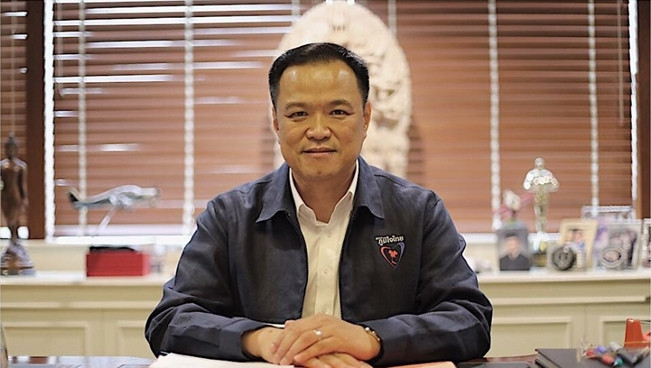
Anutin Charnvirakul
Source: Bhumjaithai Party
But the most significant factor of all could be where the Bhumjaithai Party’s allegiance lies. Led by Anutin Charnvirakul, the party has been very careful in playing the political game, and as it won 52 seats in parliament, it could be pivotal in determining which side wins a majority in the House and forms a government.
When asked if FFP would accept the nomination of by Pheu Thai of Anutin as Prime Minister, Piyabutr Saengkanokkul, the FFP Secretary-General, said that if it is not possible to have a Prime Minister from the party with the most seats, FFP is ready to vote for anyone who will end the NCPO’s continuation of power, but will not join that party’s government if it does not accept FFP’s proposals. It can therefore be said that the democratic bloc is open to the idea of Anutin becoming the Prime Minister, and even if Bhumjaithai does not accept FFP’s proposal to amend the Constitution and eliminate the NCPO’s legacy, FFP will still vote for Anutin before switching to work as the opposition.
So far, Anutin has made three points: 1. He will not let the 250 senators determine the 500 MPs; 2. He will not announce his allegiance until the official results are announced on 9 May; and 3. If Bhumjaithai gets to form the government, the other parties have to meet certain requirements including (1) no intensification of conflict, (2.) love the people, (3.) cherish the monarchy, (4.) make Thailand prosperous. Later on, his requirements became more concrete as he requires that other parties support the legalization of marijuana, and it will not compromise on this requirement.

The democratic camp
Bhumjaithai possibly realises that the formation of a government may now depend on the number of seats won by small parties, whose loyalties and numbers remain unclear. And its carefulness ensures that it will not be penalized by the ECT for joining the democratic bloc and that it can join the winner when all the fighting is over.
If the democratic bloc can overcome these difficult challenges, they can form a government with a certain degree of stability. However, if they are weakened by defection, or ECT penalties, or if Anutin decides to join the pro-Prayut coalition, it is very likely that Thailand will continue to be dominated by the junta, but now under the guise of democracy.
Prachatai English is an independent, non-profit news outlet committed to covering underreported issues in Thailand, especially about democratization and human rights, despite pressure from the authorities. Your support will ensure that we stay a professional media source and be able to meet the challenges and deliver in-depth reporting.
• Simple steps to support Prachatai English
1. Bank transfer to account “โครงการหนังสือพิมพ์อินเทอร์เน็ต ประชาไท” or “Prachatai Online Newspaper” 091-0-21689-4, Krungthai Bank
2. Or, Transfer money via Paypal, to e-mail address: [email protected], please leave a comment on the transaction as “For Prachatai English”
